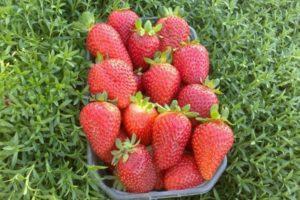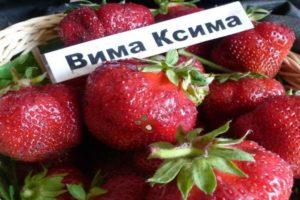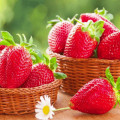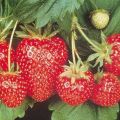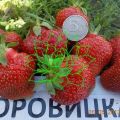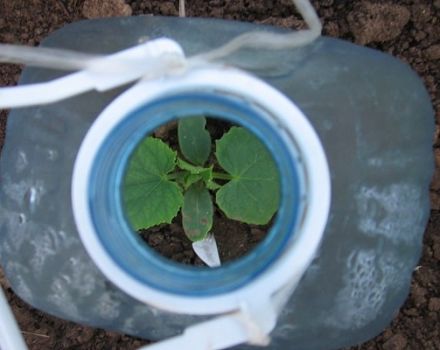Description and characteristics of the Carmen strawberry variety, cultivation and care
Strawberry is a berry with a wonderful taste and aroma, loved by many. Carmen has become one of the most popular strawberry varieties in recent years.
This berry variety was bred in the Czech Republic in 2001 and has become widespread. She is known to every gardener. This strawberry is sometimes called a “gourmet berry” because it has a distinct taste.
This species is so popular not only because of its excellent taste, but also due to its very high yield. The advantages and disadvantages of Carmen strawberries will be discussed further.
Description and characteristics of Carmen strawberry
The variety is very productive and is perfect for growing in gardens. It is also cultivated for commercial sale in small areas.
The bushes are quite large and strong. The leaves are large and oval in shape, with jagged edges. Flowers are collected in large inflorescences and arranged in such a way that they receive enough light.
The berries can be very large, they have the shape of a blunt cone. The pulp of the fruit is dark red in color, quite dense and sweet. The berry has a strong pleasant aroma.
Plant advantages and disadvantages
The variety is quite stable and reliable; it is considered a medium to medium late ripening variety. The berry mass is on average 30-35 g, in the first harvest they can be up to 50 grams. From one bush, on average, you can get up to 1 kilogram of berries per season.
The fruits can be used both fresh and processed. After heat treatment or freezing, they do not lose their taste and aroma.
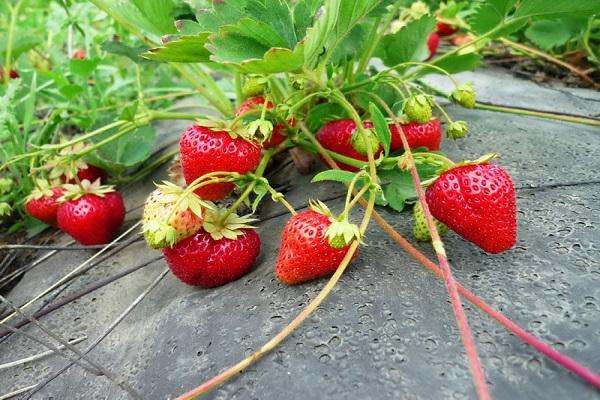
In the description of the species, it is also worth noting that the plant is very resistant to low temperatures, easily adapts to various conditions. Subject to the rules of care, even the rainy season, it can endure normally.
An additional advantage of the Carmen strawberry variety is that it is capable of harvesting quite late, when other varieties are no longer capable of bearing fruit. The bushes of this variety give the greatest number of fruits in the second year.
However, the species has some disadvantages. Yields may not always be stable. Among the minuses, one should also note the gradual decrease in fruit size and weight. By the end of fruiting, the weight of the berry can be reduced to 20 grams.

The best yield of this variety is in the second year of life.In the fifth year of staying in one place, the level of fruiting drops sharply and the berries become much smaller.
In addition, the Carmen bush itself is very voluminous, which makes frequent planting impossible.
The nuances of growing varieties
This type of garden berry has some characteristics that should be considered when growing.
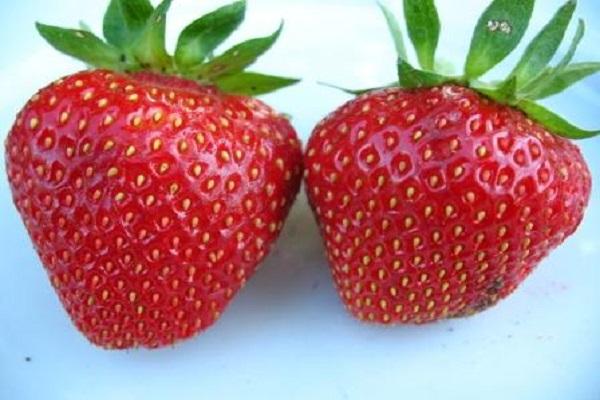
Choosing a place to plant strawberries
When planting, it is important to choose a place where there will be no drafts. Do not plant berries on a slope or on a bumpy surface. It is great if the soil is loamy.
With a high content of sand and clay, peat or humus is introduced.
Before planting, you need to properly prepare the site:
- remove weeds;
- remove excess moisture or moisten the soil;
- apply fertilizer if necessary;
- loosen the soil.
The most suitable level is Рн-6.0. If the level of acidity in the soil is increased, then liming is carried out.
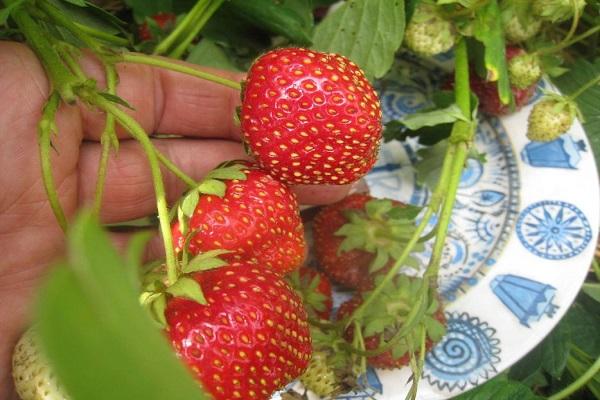
Boarding time
Reproduction by bushes can only be suitable for plants that are already 2-3 years old. This is done in the spring before flowering, or in the fall after the end of the last harvest.
If Carmen strawberries are grown from seed, they must be of good quality.
Landing in the ground
It is necessary to plant in the ground at such a time of the day that there is no active sunlight.
For some time, the planted part will have to be artificially darkened. This is done until the plants form a strong root system and can grow confidently on their own.

The selected bush, without damage, must be dug out, divided into several parts with a knife. Each piece should contain several sheets and roots.
The bushes are planted at a distance of at least 50 cm, the distance between the rows should be about 40-45 cm.
It must be remembered that when planting seedlings in the hole, you must not press hard on the roots — the plant may die.
Crop care rules
The basic rules of care are as follows:
- regular moderate watering;
- removal of the very first peduncles;
- removing weeds and excess strawberry whiskers;
- loosening the soil.
Since the fruits of this variety are quite large, it is very important to additionally fertilize the plant.
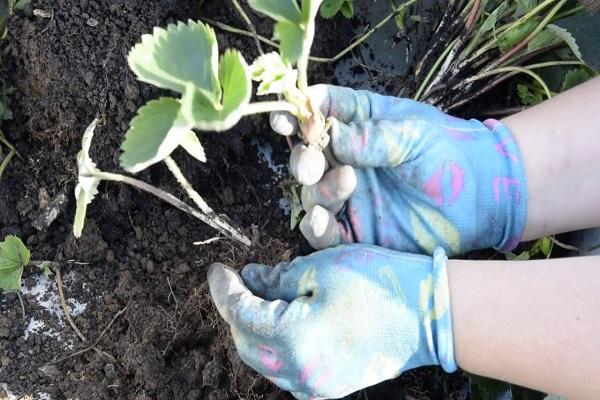
How to water strawberries
In the early days, you need to water the plants daily, preferably with rainwater. The water temperature for irrigation should not be low.
Drip irrigation is a great solution for irrigation.
How to fertilize
During the flowering of the plant, you need to fertilize with organic fertilizers. Boric acid solution can also be used. The liquid with fertilizers is applied to the soil as follows: 30 g of the finished solution goes to one square meter of land.

Loosening and weeding
After watering the bushes, the soil must be loosened and weeds removed. Overgrown antennae should be removed in time, since there will be a lot of them in a plant of this variety, this can reduce the level of fruiting.
Strawberries need weeding regularly. The need for it will be much less if mulch is available.
Mulching
In some cases, mulching is necessary when caring for berry bushes. This procedure involves covering the topsoil under the plant with mulch.
It can be such organic materials:
- straw;
- cut grass;
- sawdust;
- tree bark;
- turf;
- compost;
- moss.
They can also be inorganic:
- film;
- non-woven fabric;
- expanded clay;
- waste of paper production;
- gravel;
- pebbles.
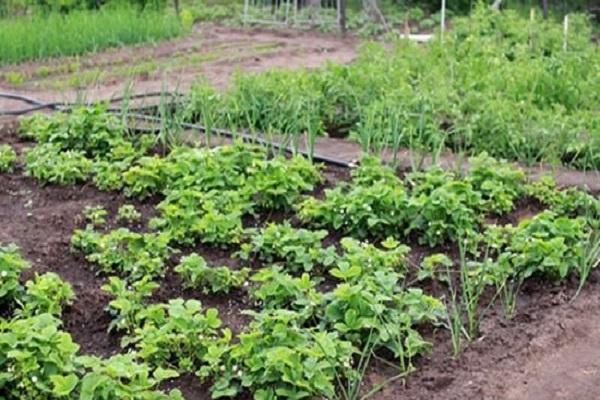
Gravel, crushed stone and pebbles are rarely used for mulching strawberries, since this interferes with caring for the bushes.
Mulching allows you to maintain the desired moisture, while the soil moisture will be moderate. Thanks to such a coating, useful minerals are not washed out from the top layer, and it also effectively protects the roots of the plant from drying out or freezing.
Such a protective layer will not let in sunlight and it will be difficult for weeds to grow near bushes. Mulch retains moisture, which means that the number of irrigations will become much less, they simply will not be needed.
The cover maintains a constant temperature in the topsoil and also maintains the necessary balance between the root system and the top of the plant.
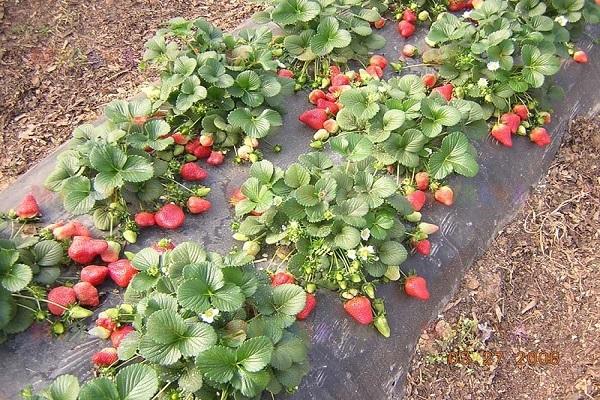
The organic mulch layer degrades over time and provides additional nutrients for strawberries. The process takes place throughout the entire period of growth, color and fruiting.
Some modern materials used for mulch look very aesthetically pleasing and can serve as the basis for a beautiful site design. A summer resident can not only successfully grow strawberries, but also make the beds very aesthetic.
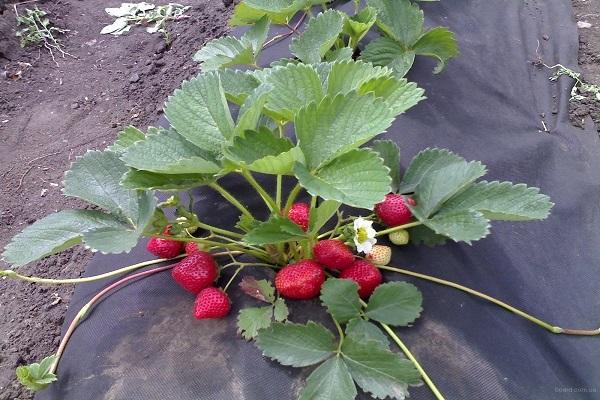
Treatment of diseases and preventive measures
This species is quite resistant to most diseases typical for strawberry bushes. An exception is gray rot - berries are easily affected by it.
The disease spreads very quickly and in a short time can destroy a large number of not only fruits, but also whole bushes. It appears in conditions of high humidity and if the plants are planted in a poorly lit and ventilated place.
Affected plants are treated completely with chemical solutions (Teldor, Horus, Switch, Alirin-B). There are also a number of folk remedies that help get rid of rot (infusion of ash, mustard, manganese and iodine solution). An excellent preventive method would be mulching.
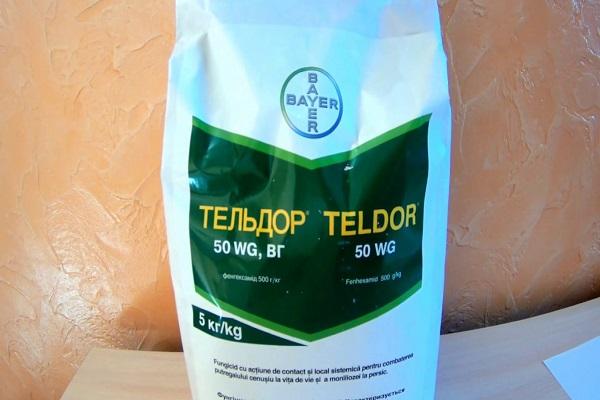
Pests and ways to get rid of them
There are also a number of pests that can harm plants.
Bushes of the Carmen variety can be affected by ticks. For removal, any summer resident can successfully use tools such as "Fufanon", "Neoron".
If a weevil is affected, the plant will not be able to bloom. To get rid of pests, they are sprayed with an infusion of wood ash or "Insecticide". In this case, it is imperative to remove the affected parts of the plant.
Leaf beetles are capable of infecting plant leaves. They are destroyed with insecticides or treated with wormwood infusion. Slugs are destroyed with freshly slaked lime or appropriate chemicals. If a nematode is affected, the affected bush will have to be completely removed.

Reproduction of Carmen
Reproduction can be done in several ways:
- with the help of stepchildren;
- seeds;
- dividing the bush.
Seeds are planted in late winter or early spring. Typically, this method is used to obtain seedlings in industrial volumes; amateur gardeners often use two other methods.
Plants are planted in the ground around mid-May. Carmen strawberries can also be planted in autumn, at the beginning of September before the first frost.

Collection and storage of strawberries
Due to their dense structure, the berries are able to keep their shape well for several days. This sets them apart from many other varieties.
Fruits of this type can be easily transported, however, the distance should not be too great, and containers for storage and transportation should be reliable, because any strawberry is a very delicate berry and can quickly lose its presentation.
